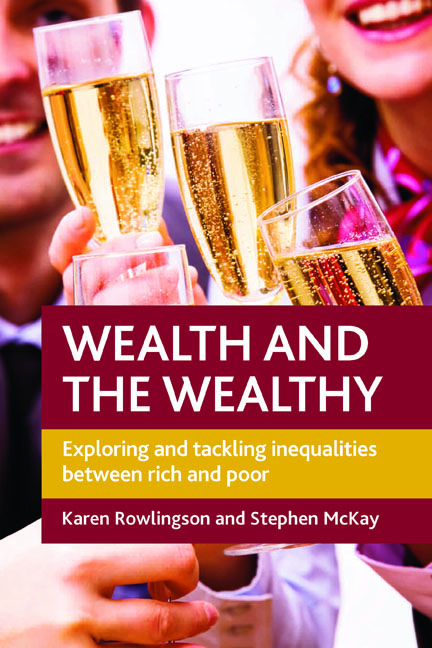Book contents
- Frontmatter
- Dedication
- Contents
- List of tables and figures
- Acknowledgements
- About the authors
- Introduction
- one Why wealth matters
- two Why the wealthy matter
- three What is wealth and who are the wealthy?
- four The distribution of wealth
- five The rich, the richer and the richest
- six Towards a comprehensive policy on assets
- seven Social policy and the wealthy
- Conclusions
- References
- Index
Introduction
Published online by Cambridge University Press: 01 September 2022
- Frontmatter
- Dedication
- Contents
- List of tables and figures
- Acknowledgements
- About the authors
- Introduction
- one Why wealth matters
- two Why the wealthy matter
- three What is wealth and who are the wealthy?
- four The distribution of wealth
- five The rich, the richer and the richest
- six Towards a comprehensive policy on assets
- seven Social policy and the wealthy
- Conclusions
- References
- Index
Summary
In recent years there has been increasing academic, policy and public interest in personal assets, and in the growing gap between rich and poor. This book brings these two issues together. Although they are conceptually distinct, they are also strongly related, with the rich having significant levels of assets while people at the bottom of the economic distribution have very few, if any. It is aimed at a wide audience, including students, academics, policy makers, journalists and members of the general public. It draws on debates from a range of disciplines including sociology, economics, politics and philosophy, and it touches on policy issues in relation to taxation, housing, pensions and education. It is therefore an ambitious book and one that we do not see in any way as definitive, but as a contribution to an important debate on wealth and the wealthy.
But why should we be interested in wealth and the wealthy rather than in the seemingly greater social problem of poverty and low income? We are not arguing that poverty and low income are unimportant, but these issues have received a great deal of attention from academics and policy makers for decades; there has been much less discussion of wealth and the wealthy. The first two chapters in the book consider why wealth and the wealthy are important issues for social science and, in particular, for social policy. We argue that wealth is an important issue because there has been increasing emphasis placed on personal assets by both Conservative-led and Labour governments in recent years. This shift towards personal assets and more individual responsibility for welfare has, however, failed to achieve its aim of greater individual financial security and wellbeing and so, we argue, a new settlement is needed. We also argue that wealth, in the form of personal assets, is important because it plays a different role in people's lives than income. There is growing evidence that wealth might have an independent effect on people's health, prospects and general wellbeing. Chapter One considers the evidence here.
The wealthy are an important subject for social science for a number of reasons. First, there is increasing discussion about whether or not the gap between rich and poor causes various social and economic problems.
- Type
- Chapter
- Information
- Wealth and the WealthyExploring and Tackling Inequalities between Rich and Poor, pp. xii - xivPublisher: Bristol University PressPrint publication year: 2011

